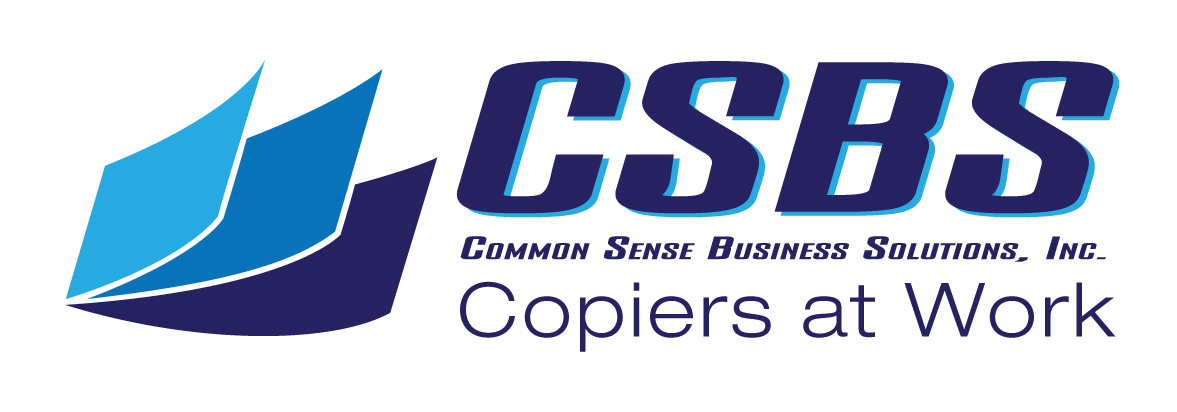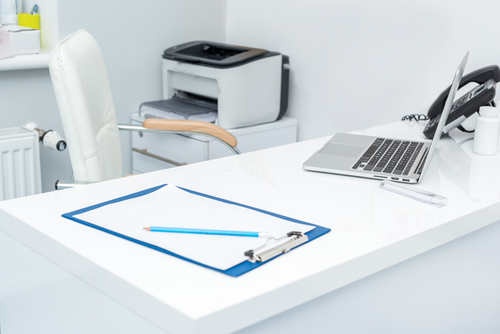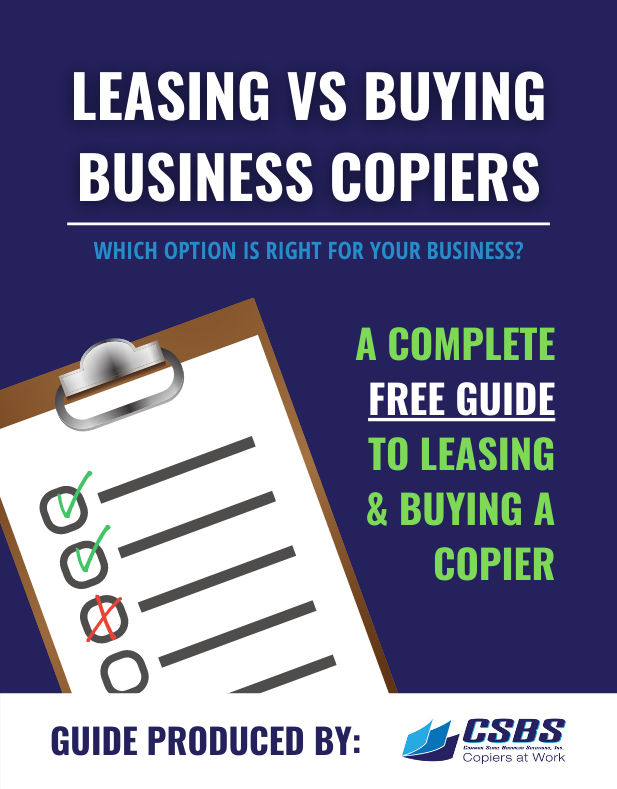Choosing the right business copier for your business is so important because copiers can positively impact nearly every other aspect of your business: sales, marketing, internal communication, and business-to-business relationships.
A few decades ago there used to be a real distinction between printers and copiers. That’s no longer the case. Today’s copiers for small business are smaller, cheaper, and much more multifunctional than anything that has come before.
Multifunctional, Digital Copiers for Small Business
Copiers for small business are able to print and copy, of course, but also scan, fax, email, download, and store everything to the cloud. The digitization of copiers for small business also enables everything you download to be shared in the office between employees or shared between other businesses.
The ability to scan a document – or, even, hundreds of documents – means that you can select a few pages or range of pages from the document that you’ve scanned and print or send over only what you need.
Copiers for small business can do double-sided, duplex copies as well as full-bleed copies, which are basically prints without the margins. If you’re hoping to have your business copier make snazzy marketing brochures, then you definitely want those two features (duplex copying and the ability to do marginless, full-bleed prints).
It might sound like something out of a science fiction novel, but today’s copiers for small business can also do stapling and three-hole punches. And since everything is stored digitally, you can have your business copier make copies and high-quality prints even when you’re out of the office.
Modern copiers for small business can perform over 100 pages per minute of network scanning and dozens of page per minute of color printing. Even relatively small copiers for small business that can sit on the end of your desk have room for over a ream of paper and additional paper drawers so printing capacity shouldn’t hinder your creativity or output.
Inkjet Versus Laser Printers
If you’re in the market for the best copiers for small business, then you should know upfront that there are differences between inkjet and laser printers. Those differences boil down to print output, print quality, and how each of these printers gets the job done.
Inkjet printers create your digital image by strategically placing drops of ink onto high-quality paper stock. Inkjet printers are usually smaller than laser printers. Yet what inkjet printers save you in space they give up in output capacity, as many laser printers can print high volume of black-and-white or color prints much more quickly.
That’s partly because laser printers go about printing in a slightly different way. Instead of dropping ink to make your prints, laser printers render digital images by scanning a laser across photoreceptors.
Basically, laser printers make a scan across a drum inside your printer, build up static electricity, then use that built-up static electricity to apply a powdered ink known as toner onto your page.
All that you really need to know is that laser printers can churn out prints and copies at a much faster clip than inkjet printers.
Laser printers are also better equipped to handle high-volume printing, and laser tone cartridges are considered more efficient in the sense that, while they might cost more upfront, you get more printed sheets for what you pay for sheet-for-sheet compared to inkjet.
Choose Your Business Copier Based on Future Needs
The choice between an inkjet and laser printer will ultimately hinge on what you need your printer to do. If you need high volumes with a lot of text and minimal graphics, then a laser printer is definitely the way to go. That’s what most small businesses are after.
On the other hand, there are benefits to be had with inkjet printers. Inkjet printers, because of the way that they operate and apply ink, are considered pretty ideal for photos or print jobs that require a lot of high-quality graphics – e.g., marketing or B2B pitches.
Inkjet printers are considered a good option for premium paper stock since they get the most mileage out of textured stationery and glossy prints. The advantage here is almost the downfall as well, though, since prints done from inkjet might fade or start to run.
The reason is that the ink from inkjet printers is water-based and more prone to damage from the elements. Small business owners should also be aware of the fact that inkjet printers can produce somewhat indistinct text when printing on regular office paper stock, which is what most small businesses are doing.
By contrast, laser printers excel at printing hundreds of pages in one go – thanks to larger input and output paper trays as well as higher printing capacity – and accurately rendering text. Laser printers can certainly handle color copies as well. In fact, many laser printers can do between two and five dozen pages of black-and-white or color prints per minute without breaking a sweat.
The takeaway is that if you only print a few pages at a time, then you probably won’t notice a huge difference between inkjet and laser printers in terms of output. Where you will notice a huge difference is when you go to print more than ten pages in a short amount of time. That’s where laser printers shine.
Many businesses might find a workable compromise in using laser printers for their everyday needs and inkjet printers for premium paper stock and one-off prints (e.g., graphics in marketing brochures).
Going that route would give you the best of both worlds since laser is better at giving you high output and printing text whereas inkjet printers can really handle graphics and work well with premium paper stocks or textured stationery. It really depends on your needs.
Purchase or Lease: Which is Better?
It’s no secret that small businesses just getting started or looking to expand are frequently on tight budgets. Sometimes shoestring budgets, in fact, after leasing out space, filling out forms, hiring lawyers and accountants, and getting the word out through advertising are all tallied up.
So, after you’ve made your decision about whether your business would benefit from an inkjet or laser printers more, how do you go about making prints and copies? For many small businesses, leasing a printer makes sense from a number of different perspectives.
Leasing might actually not even be the right term. When you lease a printer, you can opt for something called “managed print services” to help defray the costs of periodically replacing the toner and covering paper costs.
If you’re printing thousands of pages per month, then both of these costs can really add up and underscore the value of going with managed print services even more.
You can think of managed print services as a more holistic version of leasing in that you can get managed print services for your business copier that covers: toner, paper, and a generous warranty in case repairs or a replacement is needed at some future time.
Moreover, if you want the latest-and-greatest copiers for small business, then an operating lease where you rent from month-to-month and keep the asset off your balance sheet can make sense. It’s all about meeting your present and future business needs.
At CSBS, we sell, service and repair all the Konica Minolta bizhub models we sell and lease. Our highly-skilled technicians have been trained to help you keep your printer in perfect working condition. And our emergency printer repair service will help get you back up and running in no time at all.
For three decades, CSBS has leased and sold state-of-the-art printers to businesses throughout Sonoma County. Talk to us today to learn more about how owning or leasing your own copier can be one of the smartest business decisions you’ll ever make.




